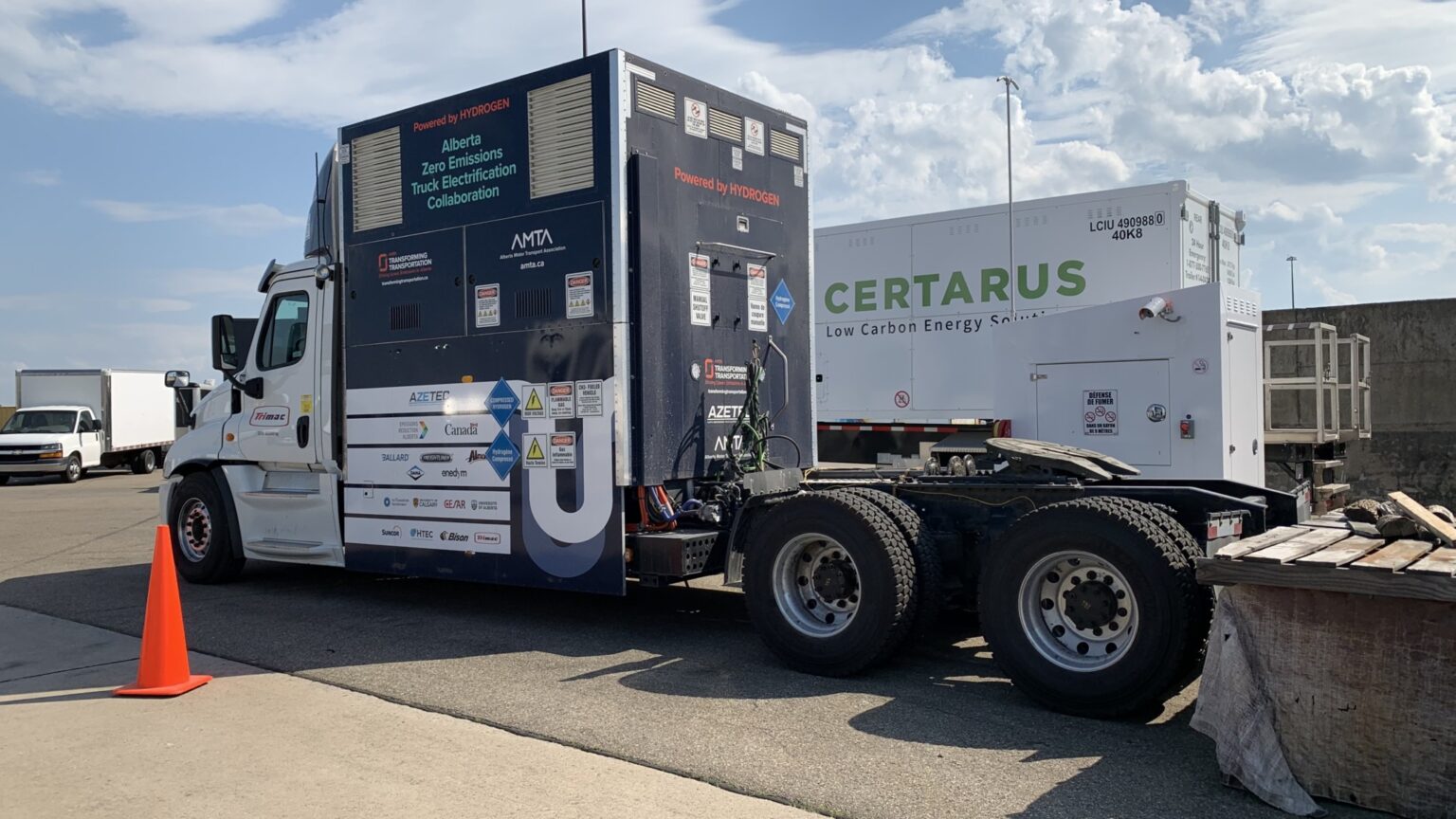Trimac은 신중한 투 트랙 접근 방식을 통해 탄소 발자국을 줄이는 데 상당한 진전을 보이고 있습니다. 이 물류 업계 선두 주자는 단순히 현재에 안주하지 않고 운영 전반에 걸쳐 연료 사용을 향상시키기 위한 효율적인 조치를 시행하는 동시에 새로운 기술을 적극적으로 테스트하고 있습니다.
캘거리에 본사를 둔 이 회사는 지속 가능성에 대한 실용적인 접근 방식을 채택하고 있습니다. 에너지 전환 및 지속 가능성 관리자인 Abraham Masri는 신중하게 진행 상황을 모니터링하는 것이 중요하다고 강조합니다. Trimac은 트랙터, 트레일러, 스트레이트 트럭을 포함한 6,294대의 다양한 장비로 구성된 차량을 운영하고 있으며, 캐나다에서 9번째로 큰 운송 회사입니다.
미래 작전을 위한 혁신 기술
앞으로 Trimac은 에드먼턴 지역에서 벌크 제품 운송을 위해 설계된 수소 연료 전지 트럭을 운영하는 AZETEC (앨버타 제로 에미션 트럭 전기화) 프로젝트에 참여하고 있습니다. 하지만 수소 기술 도입은 수소 연료의 가용성과 경제성이라는 두 가지 중요한 요소에 달려 있습니다. 게다가 Trimac은 골재, 시멘트 분말 및 다양한 가스와 같은 화물을 운송하는 동안 동력인출장치(PTO)의 사용이 필요한 문제에 직면해 있으며, 이는 현재 전기 구동 기술의 격차를 보여줍니다.
상업 테스팅의 과제
Trimac은 자사의 혁신적인 솔루션 상업 테스트 과정에서 적합한 고객과 중력을 이용해 제품 배송을 도울 수 있는 경로를 식별하는 데 어려움을 겪었습니다. 기상 추적 장비와 텔레매틱스를 활용하여 다양한 지형, 조건 및 화물 적재량에 따른 성능을 꼼꼼하게 추적했습니다.
Trimac은 2022년 말 MEDATech 및 Teck Resources와의 협력을 통해 Teck의 하이랜드 밸리 구리 광산과 B.C.주 애쉬크로프트에 있는 철도 시설 간 구리 정광 운송을 담당하는 완전 전기 무배출 클래스 8 트럭의 실행 가능성을 평가하고자 했습니다.
Western Star 4900EX 섀시를 기반으로 맞춤 제작된 이 전기 트럭은 1,448마력과 최대 토크 3,915lb-ft를 제공할 수 있는 두 개의 Dana TM4 SUMO HP 전기 모터를 탑재하여 혁신적인 기술을 수용하려는 Trimac의 노력을 보여줍니다.
예비 테스트 결과
2023년 2월에 시범 테스트가 시작되었으며, 전기 트럭은 12시간 작업 시간 동안 최대 3회의 적재 주기를 완료했으며 적절한 작동 조건 하에서는 4번째 주기가 가능했습니다. 차량 충전에는 일반적으로 2~2.5시간이 소요됩니다.
예비 평가를 1년간 실시한 후, 데이터에 따르면 전기 트럭은 동일한 매개변수와 경로에서 운행되는 기존 디젤 트럭에 비해 연간 CO₂ 배출량을 약 170톤 줄일 수 있는 것으로 나타났습니다. 그러나 Masri는 전기 트럭의 성능은 훌륭하지만 배터리 시스템의 무게 때문에 야간 운행 및 적재 용량이 저하된다는 점을 지적하며, 이는 벌크 운송 분야의 클래스 8 트럭에 대한 경제적 타당성 문제가 여전히 남아 있음을 강조합니다.
배출 감축을 위한 전환 기술
탄소 배출 제로 차량(ZEV)으로의 원활한 전환을 촉진하기 위해 Trimac은 2023년 Hydra Energy와 협력하여 자사의 Class 8 트럭 중 하나에 수소-디젤 공동 연소 키트를 장착했습니다. 이 하이브리드 시스템을 통해 차량은 최대 40%의 수소 연료 혼합을 사용할 수 있으며, 차량당 최대 40%의 온실가스 배출량 감소 효과를 얻을 수 있습니다. 이는 포괄적인 ZEV 인프라가 아직 구축되는 동안 효과적인 가교 역할을 합니다.
본 시범 프로그램은 수소의 잠재력이 필요한 동력, 적재량, 토크를 유지하면서 트럭 운송의 탄소 발자국을 줄일 수 있음을 입증합니다. 놀랍게도 이 개조된 트럭은 디젤 대안과 동일한 속도로 연료를 보급할 수 있어 운영 효율성을 유지합니다.
“Trimac은 다양한 기술에 대한 정보를 지속적으로 수집하고, 피드백을 제공하며, 추가적인 발전을 위한 길을 닦는 데 전념하고 있습니다.”라고 Masri는 밝혔습니다.
기존 탄소 발자국을 유지하기 위해 회사는 지속적으로 가장 연비가 좋은 트랙터 모델을 운영하는 것을 목표로 합니다. Trimac 차량의 99%가 효율성을 우선시하며 지난 5년 이내에 현대화되었습니다.
효율성 향상을 위한 추가 혁신
또 다른 흥미로운 발전은 운송 중 공기역학적 항력을 최소화하기 위해 통풍 머드 플랩, 즉 에코플랩을 설치한 것입니다. 이 혁신적인 플랩은 전체 차량 중 60%에 장착되어 연료 효율성 향상에 기여합니다.
더욱이, Trimac은 낮은 회전 저항 타이어와 광폭 타이어를 사용하여 연료 소비를 줄입니다. 텔레매틱스를 사용하여 연료 효율, 공회전 시간 및 경로 최적화를 모니터링함으로써, 이 회사의 차량은 공차 거리를 줄이고 운전 습관을 개선하며 연료 사용량을 약 5-7% 감소시킬 수 있었습니다.
최적의 차량 성능을 장려하기 위해 Trimac은 운전자들에게 친환경 운전 습관을 적극적으로 교육합니다. Masri에 따르면, 디젤 트럭이 향후 10년 동안 계속 도로에 있겠지만, 현실적으로 만능 해결책은 없습니다. 따라서 물류 회사는 현재 추세를 탐색하면서 기존의 효율성에 기대야 합니다.
여러분의 생각이 중요합니다.
지속 가능한 관행에 대한 물류 분야의 끊임없는 담론은 필수적입니다. 업계가 더욱 친환경적인 솔루션으로 나아가고 있다는 것은 분명하지만, 개인화된 경험은 가장 포괄적인 리뷰나 피드백보다도 중요합니다. GetTransport.com에서 사용자는 경쟁력 있는 가격으로 글로벌 화물 운송 솔루션을 쉽게 준비할 수 있으므로 과도한 지출이나 부당한 불만족 없이 정보에 입각한 결정을 내릴 수 있습니다. 이 플랫폼은 탁월한 편의성, 경제성 및 투명성을 제공하여 다양한 요구 사항을 효율적으로 충족합니다. GetTransport.com에서 오늘 교통편을 예약하세요..
결론적으로, Trimac의 혁신적인 배출량 감축 접근 방식은 물류 부문 내 지속 가능한 관행의 중요한 필요성을 강조할 뿐만 아니라, 친환경적인 미래를 만드는 데 있어 기술의 중요성을 강조합니다. 물류 회사는 수소 연료 시스템과 같은 첨단 기술을 적극적으로 모색하는 동시에 과도기적 솔루션을 채택함으로써 업계의 탄소 배출량에 큰 영향을 미칠 수 있습니다. 세계가 변화에 대비함에 따라, GetTransport.com은 신뢰할 수 있고 간소화된 운송 솔루션을 통해 진화하는 문제에 직면한 물류 회사를 지원할 준비가 되어 있습니다. 효율적인 물류와 편리성, 지속 가능성, 경쟁력 있는 가격이 만나는 GetTransport.com과 함께 미래를 맞이하십시오. 화물, 이사, 운송, 배달 서비스 등 GetTransport.com은 포괄적인 물류 요구 사항을 위한 원스톱 쇼핑을 제공합니다. 지금 바로 차량을 예약하세요. GetTransport.com.

 트리맥의 혁신적인 두 가지 전략으로 환경 영향 감소">
트리맥의 혁신적인 두 가지 전략으로 환경 영향 감소">